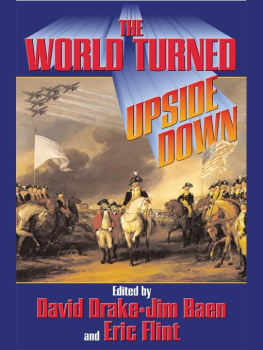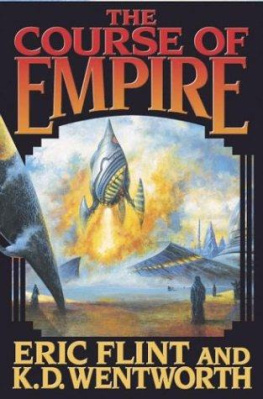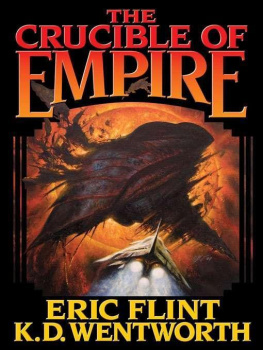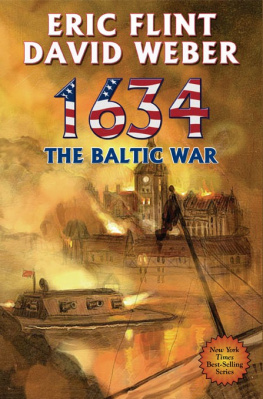Eric Flint - 1634: The Baltic War
Here you can read online Eric Flint - 1634: The Baltic War full text of the book (entire story) in english for free. Download pdf and epub, get meaning, cover and reviews about this ebook. genre: Science fiction. Description of the work, (preface) as well as reviews are available. Best literature library LitArk.com created for fans of good reading and offers a wide selection of genres:
Romance novel
Science fiction
Adventure
Detective
Science
History
Home and family
Prose
Art
Politics
Computer
Non-fiction
Religion
Business
Children
Humor
Choose a favorite category and find really read worthwhile books. Enjoy immersion in the world of imagination, feel the emotions of the characters or learn something new for yourself, make an fascinating discovery.
- Book:1634: The Baltic War
- Author:
- Genre:
- Rating:4 / 5
- Favourites:Add to favourites
- Your mark:
- 80
- 1
- 2
- 3
- 4
- 5
1634: The Baltic War: summary, description and annotation
We offer to read an annotation, description, summary or preface (depends on what the author of the book "1634: The Baltic War" wrote himself). If you haven't found the necessary information about the book — write in the comments, we will try to find it.
1634: The Baltic War — read online for free the complete book (whole text) full work
Below is the text of the book, divided by pages. System saving the place of the last page read, allows you to conveniently read the book "1634: The Baltic War" online for free, without having to search again every time where you left off. Put a bookmark, and you can go to the page where you finished reading at any time.
Font size:
Interval:
Bookmark:
Eric Flint
1634: The Baltic War
David Weber
Part One A mist that is like blown snow is sweeping over all
Chapter 1
Hans Richter Field Near Grantville, in the State of Thuringia December 1633
Colonel Jesse Wood turned off the computer in his office, removed the floppy disk and carefully slid it into its protective sleeve. It was a copy of the original disk he had already placed in an envelope and addressed to Mike Stearns, the Prime Minister of the United States of Europe. The copy itself was destined for Admiral John Simpson, Chief of Naval Operations, advisor to the head of all the USE's armed forces, and one of the chief architects of the new nation's growing industrial capability in Magdeburg.
And how he manages all three, I have no idea, Jesse thought. Lord knows I always feel about two weeks behind in my sleep. At least this report should cheer him up.
The thought wasn't as sour as it would have been some months earlier. In fact, it was rather respectful. Whatever Jesse thought of the way John Simpson had conducted himself in the two years following the Ring of Fire, the man's actions after Mike Stearns had put him in charge of the new little navy-especially during and after the Battle of Wismar-had pretty much washed all that old antagonism away. As it had, Jesse knew, for Stearns himself. Simpson might have been a disaster as a political leader, but there was no denying that as a pure and simple military commander he had a lot going for him. Even if his insistence on the punctilio of military protocol still rubbed Jesse the wrong way, now and then.
The colonel squinted out the window at the unseasonably bright, late afternoon sunlight, catching a glimpse of Master Sergeant Friedrich Krueger giving the welcoming briefing to a bunch of newly arrived recruits. The sergeant was not being gentle about it. A recruit was on the ground, rubbing his head, no doubt after having been instructed in some fine detail of service courtesy. The tall German NCO had well earned his nickname of Freddy Krueger, although Jesse doubted he understood the allusion.
He watched as the sergeant pointed to the white stripes on the sleeve of the dark brown jumpsuit that was his uniform. Perhaps he does, though, Jesse reflected. God knows they made enough of those crappy movies. One's sure to be in town somewhere.
Jesse made a mental note to ask Major Horton to have another word with the NCO about his temper. He had to admit that Krueger's techniques were highly effective, if rather crude. Still, there was no sense in beating men who had just arrived, since they probably didn't yet have enough sense to absorb the lesson. Looking at the assembled recruits, Jesse felt he knew the source of Krueger's irritation. They were a very mixed bag, as all of the latest had been. Recalling the roster on his desk, Jesse thought he could spot their origins, for the most part. Among the fifteen men, he saw several Dutch, a couple of Bavarians, other Germans of all regions and dialect, two Spanish deserters, and a Swede. One man, by his dress, appeared to be either a nobleman or the son of a rich merchant.
I wonder what he's running from? Jesse mused. Well, it doesn't matter, he's in Freddy's gentle care, now. I'll wager not one of them knows a word of English. I wonder how many of them brought families with them?
They were refugees for the most part, from all over Europe. The same sort of people who filled the ranks of most of the armies of the era. Mercenaries, at bottom, regardless of the official label of "citizen soldiers" they had in the United States of Europe.
Unfortunately from Jesse's point of view, although it saved him a lot of grief in other ways, the air force didn't get too many volunteers from the Committees of Correspondence. He'd been surprised by that, at first, since Hans Richter had been an airman and Hans was the poster boy for the CoCs. But after a little experience, the reason had become obvious enough. Lots of enthusiastic CoC members volunteered to become pilots like Hans Richter, sure enough. But in an air force that still only had a literal handful of planes, how many pilots did you need? What the air force mainly needed were people for the ground crews-and for all but a tiny number of CoC firebrands, serving behind the lines doing what they saw as mostly menial chores just didn't appeal to them. One of the many American terms that had made its way into the hybrid mostly-German dialect of the new nation emerging in central Europe was "REMFs".
Instead, they volunteered for the new regiments in the army Gustav Adolf was creating, which were sure to see action come next spring. So, for the most part, Jesse had to make do with men-and some women, here and there-who "volunteered" out of necessity rather than political fervor. Granted, that saved Jesse from having to deal with the rambunctious politics that saturated the new army regiments and had most down-time officers tearing out their hair. Most up-time officers, for that matter, who were often just as aghast as their down-time counterparts at the radical conclusions their volunteers sometimes drew about the logic of democracy as applied to military discipline.
So, true enough, Jesse was generally spared that problem. What he faced instead were the traditional ones of maintaining efficiency and discipline in a mercenary force-a problem that officers in the new army regiments rarely had to deal with. If a recruit in one of those regiments slacked off, he'd get disciplined by his CoC mates before any officer even knew a problem existed-and the discipline could be a lot more savage than anything even a sergeant like Krueger would hand out.
Jesse rubbed his eyes, pulled his leather jacket over his own brown flying suit, and grabbed the two often-used envelopes. Sweeping up his beret with its eagle insignia off his desk, he stretched his sore back and stepped out of his office into that of his adjutant. Lieutenant Cynthia Garlow was seated behind her desk, sharpening a goose feather quill, her own computer showing a floral screen saver pattern. For reasons Jesse had never been able to grasp, she preferred using quill pens over the still-perfectly-functional modern pens that had come through the Ring of Fire in plentitude.
She didn't stand up as he entered. She couldn't, having lost the use of her legs in a riding accident on the far side of the Ring of Fire. Instead, the former CAP cadet straightened to attention in her wheelchair and looked at Jesse expectantly.
"Yes, Colonel?"
Jesse smiled. "Cynthia, how many times have I told you to save the 'attention' bit for visitors? It's just the two of us here. At ease, for Pete's sake."
Cynthia tossed her short auburn curls impatiently. "About a million times, Colonel. Almost as often as I've told you I can type faster than you, so why not just dictate to me?" She looked meaningfully at the envelopes in Jesse's hand.
Jesse laid the envelopes on her desk. "Not this time, Lieutenant. This report was a pleasure to write. I've declared the Gustav flight tests completed. Now that we've finished those, the real fun begins. With luck and good weather, we'll have half a dozen trained crews by spring. Send the original to Mike Stearns in Government House on tomorrow's courier run to Magdeburg. The copy goes to Admiral Simpson."
"Yes, sir. That's great news. Anything else?"
"Yeah, send word to Major Horton that I'd like to see him in my quarters tonight at 2030, will you? I'm going to take a turn around the base, then go home. Why don't you wrap up things here and take off?"
Cynthia gave him an impish grin. "Why, thank you sir. Friedrich promised to take me to dinner in town, if we both got off early enough."
Jesse nodded and wondered again at the dichotomy of Sergeant Krueger's renowned harshness to recruits and his obvious love for the crippled girl in the wheelchair. His gentleness and deference to her was an unceasing wonder to all who witnessed it. Cynthia was lovely and doubtless her fluency in German helped, but still Jesse was glad he hadn't found the need to institute any of the fraternization rules from the other time line. Planting his beret on his head, eagle shining, he moved toward the door.
Font size:
Interval:
Bookmark:
Similar books «1634: The Baltic War»
Look at similar books to 1634: The Baltic War. We have selected literature similar in name and meaning in the hope of providing readers with more options to find new, interesting, not yet read works.
Discussion, reviews of the book 1634: The Baltic War and just readers' own opinions. Leave your comments, write what you think about the work, its meaning or the main characters. Specify what exactly you liked and what you didn't like, and why you think so.
















